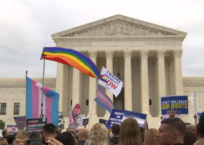
Written by Jorge Gomez
The landmark U.S. Supreme Court ruling in the Faithful Carrier case (Groff v. DeJoy) changed the legal standard for religious accommodation at work. This will impact all businesses with 15 or more employees.
After the Groff decision, employers should revise their religious accommodation policies, provide training for managers and human resources departments, and reevaluate any pending claims for religious accommodations to ensure compliance with federal law.
First Liberty legal experts provide tips and guidance below to help business owners, employees and HR professionals understand and navigate changes to the law.
What Are Religious Accommodations at Work?
Employees may request religious accommodation when there is a conflict between a job requirement and their religious beliefs. Employees of faith may request accommodations to be allowed to observe holy days, attend worship services, follow the dress or modesty requirements of their faith, or otherwise not be forced to violate their religious beliefs on the job. Employers should evaluate all such requests in accordance with applicable law.
How Did the Law Change?
Title VII of the Civil Rights Act, as amended, applies to workplaces across the country that have 15 or more employees. It applies to private businesses as well as government employers. The law requires employers to give employees reasonable religious accommodations unless doing so would cause an undue hardship on the business.
Previously, “undue hardship” was defined by the Court as a “de minimis cost.” Under the prior standard, employers could deny religious accommodations by pointing to a minimal burden on the business.
The U.S. Supreme Court decision in Groff v. DeJoy clarified that employers must provide reasonable religious accommodations unless they can prove that doing so would “result in substantial increased costs in relation to the conduct of its particular business.”
This standard is to be evaluated considering many factors. Nature, size, and operating cost of the employer are all important aspects. This means larger employers will more often be required to grant religious accommodations. The Court also clarified that animosity or hostility toward an employee’s religious beliefs cannot provide a defense to a religious accommodation claim.
What Does This Look Like in Practice?
The U.S. Supreme Court’s opinion cited examples of actions employers may need to take, the costs of which usually will not justify denying a religious accommodation:
- Accommodate religious exceptions to dress code requirements, which would allow employees to wear headscarves, yarmulkes and other items for religious purposes
- Cover occasional absences, which would allow employees to observe holy days or attend worship services
- Expend administrative costs in reworking schedules
- Pay infrequent or temporary premium wages for a substitute
- Facilitate or allow voluntary substitutes and swaps among employees
This list is not exhaustive and should be understood as representing the minimum that will be required for most businesses. Each accommodation request should be addressed individually based on its facts. Employers are also required to consider other available options that would resolve the conflict between the job and the employee’s religious beliefs. In addition, considering any alternatives suggested by the employee is recommended. The best practice is to engage in an interactive dialogue with the employee to find a solution.
What Should My Business Do Now?
1. Revise Employee Handbooks & Religious Accommodation Policies
Update forms and policies for processing religious accommodation requests. Ensure that the “de minimis” or minimal burden test is no longer used and is replaced with a “substantial cost” undue hardship test. The best practices make it clear that your company respects religious diversity and endeavors to grant religious accommodation requests where possible.
2. Provide Immediate Non-Discrimination Training for Managers and HR Departments
Anyone at your company who is responsible for handling religious accommodation requests should be made aware of the newly clarified standard for evaluating these requests. New training should be provided to ensure compliance with the law.
3. Reconsider Any Pending Religious Accommodation Requests & Pending Cases
Because the decision interprets the 1972 amendments of the Civil Rights Act, the clarified undue hardship standard likely applies retroactively. Any pending religious accommodation requests and pending lawsuits should be reevaluated.
Still unsure if your business is complying with religious accommodation laws? First Liberty is your First Call for legal assistance: (972) 941-4444. A great team of legal experts and lawyers are standing by to assist business owners, working professionals and Americans of all faiths with questions about protecting religious liberty in the workplace.























